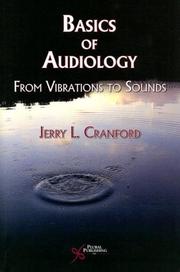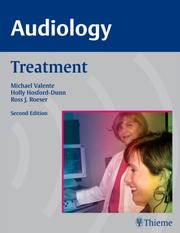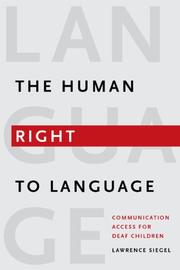| Listing 1 - 10 of 41 | << page >> |
Sort by
|
Book
Year: 2008 Publisher: Bethesda, MD : U.S. Department of Health & Human Services, National Institutes of Health, National Institute on Deafness and Other Communication Disorders,
Abstract | Keywords | Export | Availability | Bookmark
 Loading...
Loading...Choose an application
- Reference Manager
- EndNote
- RefWorks (Direct export to RefWorks)
Book

ISBN: 9782294704406 2294704401 Year: 2008 Publisher: Issy-les-Moulineaux: Elsevier,
Abstract | Keywords | Export | Availability | Bookmark
 Loading...
Loading...Choose an application
- Reference Manager
- EndNote
- RefWorks (Direct export to RefWorks)
Hearing Loss --- Presbycusis --- Hearing Disorders --- Ear
Book
ISBN: 1933812753 Year: 2008 Publisher: Boston : Harvard Health Publications,
Abstract | Keywords | Export | Availability | Bookmark
 Loading...
Loading...Choose an application
- Reference Manager
- EndNote
- RefWorks (Direct export to RefWorks)
If you thing you might need a hearing checkup, you probably do. This special health report describes the causes and cures for hearing loss. You'll learn about the latest advances in hearing aid technology and find out which kind of hearing device may be best for you. This report also contains in-depth information on the causes, diagnosis, and treatment of hearing loss. You'll also learn how to prevent hearing loss and preserve the hearing you have now.
Forensic audiology. --- Hearing aid technology. --- Hearing loss.
Book
ISBN: 9780120885213 0120885212 Year: 2008 Publisher: Bingley, UK : Emerald,
Abstract | Keywords | Export | Availability | Bookmark
 Loading...
Loading...Choose an application
- Reference Manager
- EndNote
- RefWorks (Direct export to RefWorks)

ISBN: 1597568813 9781597568814 9781597561808 1597561800 Year: 2008 Publisher: San Diego
Abstract | Keywords | Export | Availability | Bookmark
 Loading...
Loading...Choose an application
- Reference Manager
- EndNote
- RefWorks (Direct export to RefWorks)
Includes all the necessary audiological principles needed for any SLP student to become competent in test assessment and the diagnosis of hearing disorders. Mastery of this text will enable the future clinician practice in a wider patient base.
Deaf --- Audiology. --- Hearing disorders --- Hearing --- Rehabilitation. --- Diagnosis. --- Deaf people
Book
Year: 2008 Publisher: Atlanta, GA : Dept. of Health and Human Services, Centers for Disease Control and Prevention, National Center on Birth Defects and Developmental Disabilities, Division of Human Development and Disability, Early Hearing Detection and Intervention,
Abstract | Keywords | Export | Availability | Bookmark
 Loading...
Loading...Choose an application
- Reference Manager
- EndNote
- RefWorks (Direct export to RefWorks)

ISBN: 9781588905208 9783131164223 Year: 2008 Publisher: New York Thieme
Abstract | Keywords | Export | Availability | Bookmark
 Loading...
Loading...Choose an application
- Reference Manager
- EndNote
- RefWorks (Direct export to RefWorks)
28
Audiology --- Hearing disorders --- #KVHB:Audiologie --- #KVHB:Gehoorstoornissen; therapie --- Auditory disorders --- Defective hearing --- Disorders of hearing --- Hearing defects --- Hearing impairments --- Communicative disorders --- Disabilities --- Ear --- Sensory disorders --- Hearing --- Treatment --- Diseases --- Audiologie --- Therapie
Book
ISBN: 9781604060010 Year: 2008 Publisher: New York Thieme
Abstract | Keywords | Export | Availability | Bookmark
 Loading...
Loading...Choose an application
- Reference Manager
- EndNote
- RefWorks (Direct export to RefWorks)
Book
ISBN: 9004652590 Year: 2008 Publisher: Brill Academic Publishers
Abstract | Keywords | Export | Availability | Bookmark
 Loading...
Loading...Choose an application
- Reference Manager
- EndNote
- RefWorks (Direct export to RefWorks)
Aimed at speech and hearing sciences students, this book introduces to the principles of signal and system analysis. Beginning with an examination of what signals and systems are, it develops a background from which many of the issues in speech and hearing can be tackled.
Hearing. --- Speech. --- Auditory pathways. --- Speech processing systems.

ISBN: 9781563683664 1563683660 Year: 2008 Publisher: Washington (D.C.) : Gallaudet university press,
Abstract | Keywords | Export | Availability | Bookmark
 Loading...
Loading...Choose an application
- Reference Manager
- EndNote
- RefWorks (Direct export to RefWorks)
In 1982, the United States Supreme Court ruled that Amy Rowley, a deaf six-year-old, was not entitled to have a sign language interpreter in her public school classroom. Lawrence Siegel wholeheartedly disagrees with this decision in his new book 'The Human Right to Language: Communication Access for Deaf Children'. Instead, he contends that the United States Constitution should protect every deaf and hard of hearing child's right to communication and language as part of an individual's right to liberty. Siegel argues that when a deaf or hard of hearing child sits alone in a crowded classroom and is unable to access the rich and varied communication around her, the child is denied any chance of success in life. In 'The Human Right to Language', Siegel proposes that the First and Fourteenth Amendments of the Constitution be enforced so that Amy Rowley and her peers can possess that which virtually every other American child takes for granted - the right to receive and express thought in school. He asserts that the common notion of a right to "speech" is too infrequently interpreted in the narrowest sense as the right to "speak" rather than the broader right to receive and transmit information in all ways. Siegel reveals that there are no judicial decisions or laws that recognize this missing right, and offers here a legal and constitutional strategy for change. His well-reasoned hypothesis and many examples of deaf children with inadequate communication access in school combine to make a compelling case for changing the status quo.
Deaf children --- Deaf --- Hearing impaired children --- Hearing impaired --- Education --- Legal status, laws, etc. --- Means of communication.
| Listing 1 - 10 of 41 | << page >> |
Sort by
|

 Search
Search Feedback
Feedback About UniCat
About UniCat  Help
Help News
News